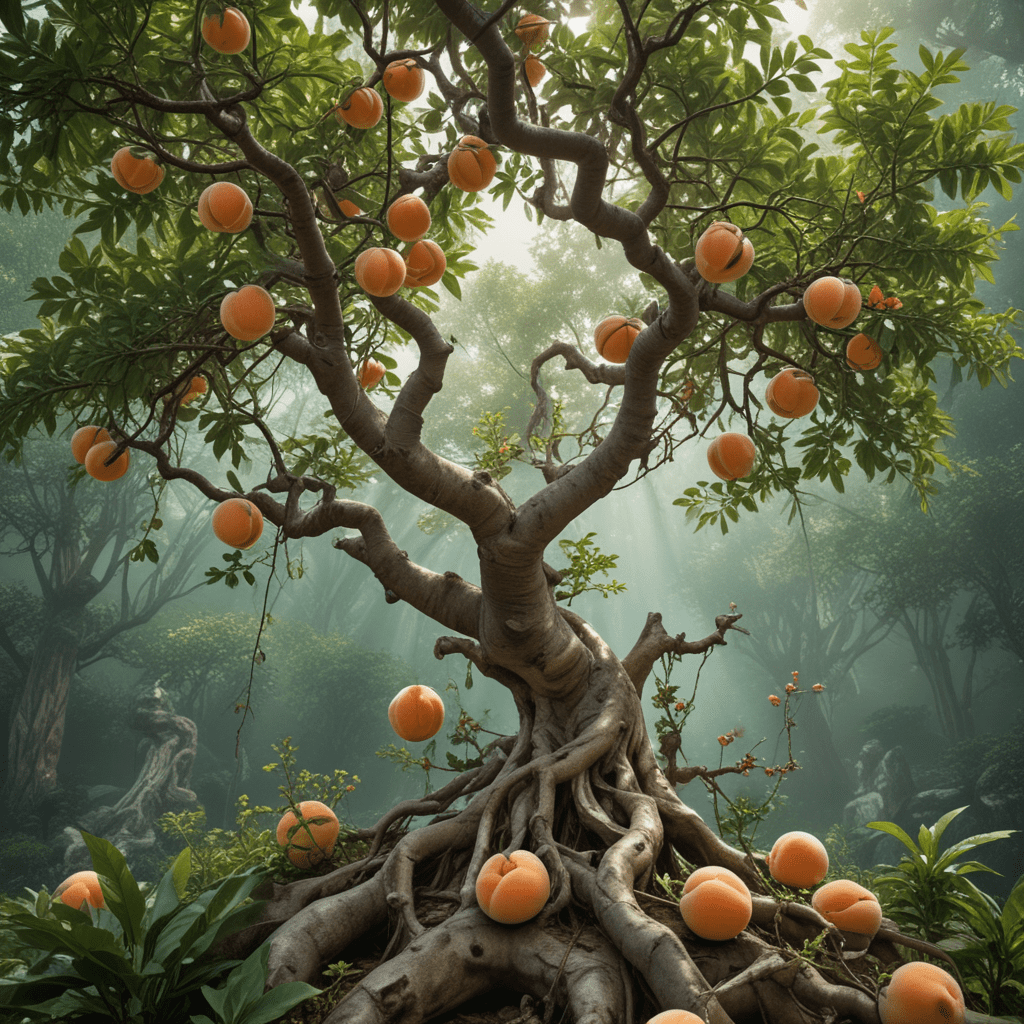Introduction
Chinese mythology is abundant with tales of fantastical plants and trees that possess extraordinary powers. Among the most renowned are the Peaches of Immortality and the Ginseng root. These mythical botanical wonders have permeated Chinese culture for centuries, captivating imaginations and shaping beliefs about longevity, health, and the supernatural.
Peaches of Immortality: Symbolism and Origin
The Peaches of Immortality are celestial fruits that grant eternal life to mortals who consume them. Their origins can be traced to the ancient Chinese belief in the cyclical nature of the universe. It was believed that a colossal Peach Tree grew at the edge of the cosmos, its branches extending into the heavens and its roots penetrating the underworld. This tree bore fruit every three thousand years, and each peach represented a chance for mortals to escape the cycle of death and rebirth.
The Heavenly Peach Tree and Its Guardian
The Heavenly Peach Tree was guarded by a fearsome deity known as Xi Wangmu, the Queen Mother of the West. Xi Wangmu possessed immeasurable power and was entrusted with the safekeeping of the Peaches of Immortality. She was often depicted as a beautiful yet aloof figure, her face adorned with a third eye that could see through all deception.
The Legend of Xi Wangmu and the Peach Feast
A famous legend recounts the tale of Xi Wangmu's Peach Feast. Every three thousand years, the Queen Mother would invite select immortals and worthy mortals to a grand banquet in her celestial palace. At the feast, guests were offered Peaches of Immortality, and those who partook were bestowed with eternal life. However, attending the feast was a perilous endeavor, as guests had to navigate treacherous landscapes and overcome formidable obstacles to reach Xi Wangmu's palace.
Ginseng: A Miraculous Herb
Ginseng is a perennial herb native to East Asia and is renowned for its medicinal properties. It has been used in Traditional Chinese Medicine (TCM) for centuries to enhance vitality, improve cognitive function, and bolster the immune system.
The Legend of Ginseng's Discovery
According to legend, ginseng was discovered by a Taoist farmer named Wu Shixiong. While working in his fields, Wu noticed that his tired oxen became reinvigorated after consuming the roots of a certain plant. Intrigued, he dug up the roots and experimented with them, discovering their remarkable medicinal qualities.
Medicinal Properties and Uses
Ginseng is known as a powerful adaptogen, a substance that helps the body resist stress and maintain homeostasis. It contains various active compounds, including ginsenosides, which have antioxidant, anti-inflammatory, and immune-boosting effects. Ginseng is commonly used to improve energy levels, reduce fatigue, enhance cognitive function, and support overall well-being.
Cultivation and Importance in Chinese Culture
Ginseng is primarily cultivated in China, Korea, and North America. Wild ginseng is rare and highly sought after, but most ginseng consumed today is cultivated. In Chinese culture, ginseng is revered as a symbol of longevity and vitality. It is often given as a gift to honor elders and celebrate special occasions.
Peaches and Ginseng in Chinese Folklore
The Peaches of Immortality and ginseng often appear together in Chinese folklore, representing the duality of eternal life. Peaches symbolize the celestial path to immortality, while ginseng represents the earthly way. Together, they embody the pursuit of both physical longevity and spiritual enlightenment.
Conclusion: The Enduring Legacy of Mythical Plants in Chinese Tradition
The Peaches of Immortality and Ginseng are enduring symbols of the Chinese fascination with immortality, health, and the supernatural. These mythical plants have shaped beliefs and practices in Chinese culture for centuries, inspiring legends, rituals, and a profound respect for the natural world. Their legacy continues to resonate in modern times, reminding us of humanity's eternal aspirations and the enduring power of myth and imagination.
FAQs:
What is the difference between Peaches of Immortality and Ginseng?
Peaches of Immortality are celestial fruits believed to grant eternal life, while Ginseng is an earthly herb known for its medicinal properties.Can Peaches of Immortality be found in real life?
No, Peaches of Immortality are mythical fruits found only in Chinese mythology.What are the main medicinal uses of Ginseng?
Ginseng is used to enhance vitality, improve cognitive function, boost the immune system, and reduce fatigue.
How is Ginseng cultivated?
Ginseng is primarily cultivated in China, Korea, and North America. It requires specific soil conditions and meticulously controlled growing environments.Are Peaches of Immortality and Ginseng still relevant in modern Chinese culture?
Yes, both Peaches of Immortality and Ginseng continue to hold symbolic importance in Chinese culture, representing longevity, health, and the pursuit of eternal life.


